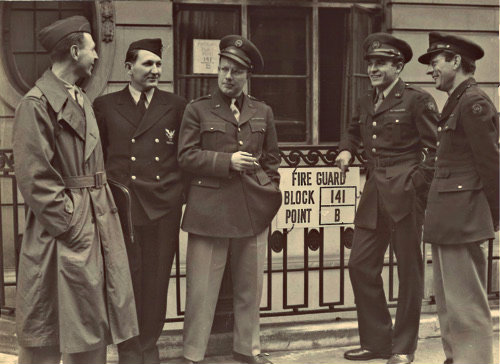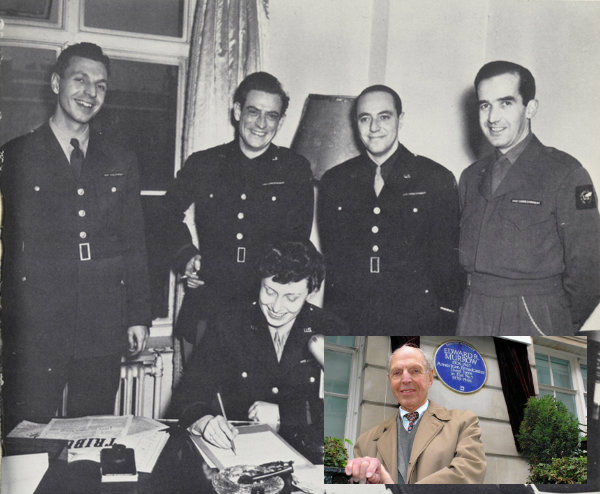Richard Hottelet, a longtime correspondent of CBS News, a WWII reporter and the last living member of the “Murrow Boys”, died last December 17 at his home in Wilton, Connecticut. He was 97 years old. let us look back at the legacy left behind by this wartime correspondent described by colleagues as “aggressive and fearless, a man who refused to be intimidated by Nazis and Allies alike”.
His Beginnings
Richard Hottelet was born on September 22, 1917 in Brooklyn to German immigrant parents. After graduating from Brooklyn College with a degree in philosophy in 1937 but without any prospects for work, his father advised him to to go to Germany and take some classes at the university in Berlin using money from a blocked bank account of the family. Richard heeded his father’s advice.
However, after attending several classes in the University of Berlin, the 20-year-old dropped out. Nazi propaganda seeping through the classrooms of the said institution didn’t sit well with him. He had lived with a cousin of his father, also a businessman, who risked his life aiding Jewish friends, and seeing his philosophy professor don on a Brown Shirt uniform with a Nazi arm band and starting classes with the classic Nazi salute and the “Heil, Hitler” call repelled him.
Richard Hottelet looked for work and landed one as a stringer for the United Press’ Berlin bureau. Eventually, he was promoted to being a full-time correspondent.
Hottelet soon earned the moniker “major pain in the Nazis’ asses” while working as a journalist in Germany. In the 1996 book about the “Murrow Boys”, The Murrow Boys: Pioneers on the Front Lines of Broadcast Journalism, authors Stanley Cloud and Lynn Olson wrote about how one time, Richard Hottelet was arrested for pointedly questioning Gestapo agents when he saw them loading Jews into trucks. Furthermore, he irked the Nazi authorities for reporting about the damages caused raiding British night bombers in Berlin.
In another anecdote, he was said to have been taken into interrogation by the organization when he phoned in a story about how he had spent time with a group of deported Jews while they were on the German-Polish border.
In 1941, Richard Hottelet was arrested by the Gestapo on the charges of espionage as he was believed to have shared vital German military information to his English girlfriend Ann Delafield and actually spent four months behind bars. Fortunately, he, and another imprisoned American journalist, was released in exchange for the two Germans who had been imprisoned in the US as spies.
Upon his return to America, he went to work with the United Press’ Washington bureau for a few months before transferring to the Office of War Information. After one year and a half working in the OWI London office, he approached Edward Murrow for a job.
One of the “Murrow Boys”
![Richard Hottelet [indicated with the yellow circle] along with some of the other members of the "Murrow Boys" and Edward Murrow himself [right].](https://www.warhistoryonline.com/wp-content/uploads/sites/64/2015/01/Richard-Hottelet-Last-of-the-Murrow-Boys.jpg)
Richard Hottelet dared to risk his life in line of his work as a wartime journalist reporting from the front lines of some of WWII’s major campaigns.
He flew over Utah Beach in a B-26 Marauder bomber as he reported about the first wave of Allied troops landing ashore Normandy on D-Day, June 6, 1944. He is credited for being the first CBS correspondent to report an eyewitness account of the invasion.
https://www.youtube.com/watch?v=I8xkQ05VT_k
October that same year saw Richard Hottelet leaning from a window in Aachen, Germany reporting about the ongoing street fight in his wire recorder while machine guns fired and shell flew past. December 1944 saw him covering the heavy German attack in Belgium, now famously known as the Battle of the Bulge.
While on duty, Richard Hottelet had to even bail out of a B-17 bomber on fire after it was hit by antiaircraft gun. The month was March of 1945 and he was covering Operation Varsity. Fortunately, Hottelet was only able to incur minor injuries after landing in a cow pasture in France.

After the War
Richard Hottelet continued on with his journalistic career even after WWII ended. He went on to be a correspondent in the Soviet Union and Bonn, West Germany during the Cold War. Finally, he covered the going-ons in the United Nations for CBS from 1960 to 1985, the year he retired.
Richard Hottelet became the last of the “Murrow Boys” to retire from service.
Speaking about his days as a WWII correspondent for CBS, Richard Hottelet said that they, the 11 Murrow Boys one of whom was a woman, were not around to educate or move or inspire the people. Their job was to simply relay to the public what was going on, piece by piece. The job they had was a serious one and they were out there, being one of the 100,000 other people in the field flying in the front lines and risking getting shot at.
Knowing the heritage he had left behind in war history, let us all say:
Goodbye, WWII correspondent and last of the “Murrow Boys” Richard Hottelet!
